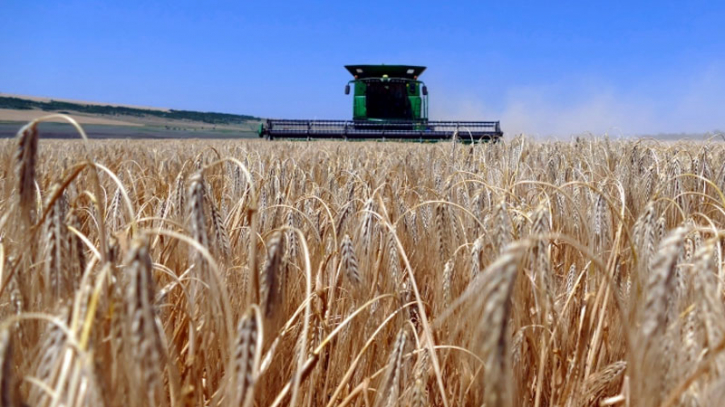Moscow halts grain deal. It's no good news

The global wheat market was roiled by geopolitical tensions as the price of wheat soared to $380 per tonne after the Russia-Ukraine war commenced in February of last year.
These two nations alone account for nearly one-third of global wheat production. However, the market witnessed a subsequent decrease in price by over $100 per tonne, settling at $260, primarily due to the Black Sea grain deal brokered by the United Nations and Turkey.
But the latest news of Russia's suspension of the grain deal has reignited concerns, resulting in a 3% increase in wheat prices during Monday's Chicago trading, reaching $6.81 per bushel (equivalent to 27 kilograms).
The ripple effect of this price surge has raised alarm bells for Bangladeshi consumers as a potential rise in wheat prices is anticipated within the country, which heavily relies on Russia, Ukraine and India to meet 65% of its annual wheat demand.
Consumption of wheat in Bangladesh has been rising in line with the pace of economic development and the rising purchasing power of consumers. Industry insiders said the country's wheat consumption was only 3 lakh tonnes in 1990.
Currently, a 2kg packet of wheat flour currently sells at Tk120 to Tk140, depending on the brands, up from Tk80 to Tk100 before the war.
Abul Bashar Chowdhury, chairman of BSM Group and one of the largest wheat importers, expressed his apprehension, stating that Russia's withdrawal from the grain deal could have a detrimental impact.
He told The Business Standard on Monday that the likelihood of supply shortages and the subsequent impact on prices if the major wheat sources were to be disrupted.
Bashar further said a shipment of wheat from Ukraine had recently arrived at Chattogram port. However, due to declining wheat prices resulting from favourable production and harvesting conditions, he refrained from placing an order.
Now, he fears that prices may escalate, mirroring the global trends observed at exchanges like the Chicago Board of Trade.
If Bangladesh can import wheat from Russia, there will be no big problem. Presently, less than a dozen banks open LCs for imports from Russia, Bashar noted.
"If more banks open LCs for import from Russia, there will be no shortage," he said, adding that it is possible amid the ongoing sanctions on Russia as many countries are doing this.
The Black Sea Grain Initiative, launched in July of last year, allowed three Ukrainian ports to export 32.9 million tonnes of grain and other food products worldwide, with over half being destined for developing nations, according to the Joint Coordination Centre in Istanbul.
Although the agreement was last renewed for 60 days in May, the amount of food shipped and the number of vessels departing Ukraine have dwindled in recent months, with Russia being accused of obstructing additional ships from participating.
Biswajit Saha, director for Corporate and Regulatory Affairs of City Group, said their wheat imports primarily originate from Canada and the United States.
Nevertheless, the announcement of the grain deal suspension by Russia prompted an immediate 3-4% price increase, exacerbating market challenges already heightened by supply shortages due to the ongoing dollar crisis.
The Food Planning and Monitoring Unit under the Ministry of Food reported that as of June 25 in the fiscal year 2022-23, the government imported 6.8 lakh tonnes of wheat, while the private sector imported 30.73 lakh tonnes. These figures indicate that the annual total would likely reach approximately 38 lakh tonnes, down from over 40 lakh tonnes the previous year.
In the fiscal year 2020-21, Bangladesh imported over 53 lakh tonnes of wheat, with the quantity surging to nearly 65 lakh tonnes in 2019-20, marking a historical high for the country.
Major importers of wheat in Bangladesh include City Group, Meghna Group of Industries, Bashundhara Group, TK Group, BSM Group, Abul Khair Group, Akij Group and Nabil Group.
Abdus Shukur, Chief Operating Officer of the Supply Chain Division at Bashundhara Group, lamented the impact of the Black Sea grain deal suspension, as the company traditionally sourced wheat from Russia and Ukraine. The interruption in this crucial grain deal is poised to disrupt the sourcing of this staple food commodity.
Russia on Monday halted participation in the year-old UN-brokered deal, just hours after a blast knocked out Russia's bridge to Crimea in what Moscow called a strike by Ukrainian sea drones, reports Reuters.
The Kremlin said two civilians were killed and their daughter wounded in what Moscow cast as a terrorist attack on the road bridge, a major artery for Russian troops fighting in Ukraine.
According to the Russian government, there was no link between the attack and its decision to suspend the grain deal, over what it called a failure to meet its demands to implement a parallel agreement easing rules for its own food and fertiliser exports.
"In fact, the Black Sea agreements ceased to be valid today," Kremlin spokesman Dmitry Peskov told reporters on a conference call.
"Unfortunately, the part of these Black Sea agreements concerning Russia has not been implemented so far, so its effect is terminated."
Source: The Business Standard
.png)




